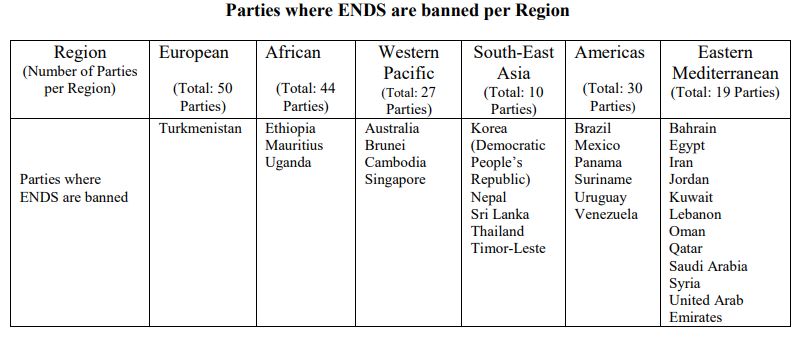FCTC ignoring founding principles

“The Eighth session of the Conference of the Parties (COP8) to the WHO Framework Convention on Tobacco Control (WHO FCTC) is less than three months away. Taking place in Geneva from 1 to 6 October, it will focus on topics such as the shaping of a medium-term strategic framework, which will determine the actions to be taken by the Parties over the next five years, and the advances and challenges revealed in the Global Progress Report on Implementation of the WHO Framework Convention on Tobacco Control.
The Conference will also be the starting point for a wider application of the WHO FCTC not only for tobacco control, but also as an international treaty to support sustainable development, fight climate change and defend human rights.”
For those not familiar with the “Conference of the Parties” (COP), it is a bi-annual event where around a thousand grey, soulless, anti-smoking extremists from all over the world swan off to a swanky conference centre (last time around in Delhi, India) to discuss a variety or authoritarian measures to further prohibit smokers from enjoying their habit. They also spend a lot of time debating whether or not the public and press should be allowed to witness what goes on, along with debating whether or not to ban e-cigs and other harm reduction products.
Oh, and it’s all funded by the taxpayer of the attending countries.
Amusingly, the very front page of the Framework Convention on Tobacco Control is very telling, specifically the second paragraph:
The Conference will also be the starting point for a wider application of the WHO FCTC not only for tobacco control, but also as an international treaty to support sustainable development, fight climate change and defend human rights.
Nothing like highlighting a slippery slope is there? Have these loons forgotten that there is already a COP for climate change - subtly rebranded, I notice, to “Global Conference on Health and Climate” - now approaching its 23rd session?
I digress.
This document has been circulating around various advocates and it is a hideous piece of wibble. As is the norm for these things, COP8 will spend an inordinate amount of time discussing this latest “report” which, as we’ll see, is stuffed full of the usual pharma-backed nonsense. The last “report” was, rightly, ripped to shreds by the more honest colleagues in their profession.
After going over some of the more uh, “unique” decisions taken at previous shindigs - such as this gem:
Furthermore, the Working Group on Articles 9 and 10 requested the COP to indicate whether it agreed that ENDS are to be considered “tobacco products” and should be part of future work of the working group. There was, however, no decision made on whether ENDS should be considered tobacco products.
Perhaps delegates should refresh their memories on the definition of “tobacco product” as detailed in Article 1 (f) of the FCTC itself:
“tobacco products” means products entirely or partly made of the leaf tobacco as raw material which are manufactured to be used for smoking, sucking, chewing or snuffing;
Then there is this:
WHO presented a report on ENDS to the Sixth session of the Conference of the Parties (COP6) in 2014 (FCTC/COP/6/10 Rev.1), which included the deliberations and scientific recommendations on ENDS made by TobReg and on the analysis from a WHO survey on tobacco products in which 90 WHO Member States, of which 86 were Parties to the WHO FCTC, responded. The survey showed that more than 50% of the Parties did not regulate ENDS, which prompted in the same report a proposal for a regulatory framework for ENDS.
Which, regular readers will remember, is the FCTC deliberately misinterpreting science to suit their own agenda - much like the EU did - and that is to effectively ban anything they can’t control.
Let us not forget this:
COP6 decision FCTC/COP6(9) requested the Convention Secretariat to invite WHO to prepare a report on ENDS and electronic non-nicotine delivery systems (ENNDS) for the Seventh session of the Conference of the Parties (COP7). This decision also invited Parties to take measures to address the challenges posed by END/ENNDS and consider prohibiting or regulating them, including as tobacco products, medicinal products, consumer products or other categories, as appropriate, taking into account a high level of protection for human health.
I remember COP6. It was an absolute shitshow.
So far, I’ve quoted a few of the paragraphs from the six-page document and it isn’t until I get to page 3 where I spot this:
In 2016 WHO presented a report (FCTC/COP/7/11) to COP7 updating the evidence of the health impact of ENDS/ENNDS, their potential role in tobacco cessation and their impact on tobacco control efforts, as well as an assessment on regulatory options.
This is the only mention, vague as it is, that upholds the founding principle of the FCTC itself. Notably, Article 1 (d):
“tobacco control” means a range of supply, demand and harm reduction strategies that aim to improve the health of a population by eliminating or reducing their consumption of tobacco products and exposure to tobacco smoke;
The report has helpfully detailed where e-cigs are completely banned, so it makes choosing your next holiday a bit easier:

It seems that the FCTC isn’t too happy that some signatories aren’t bothering to regulate e-cigs too:
Despite ongoing discussions in the COP over the last 10 years with regard to potential approaches to regulate ENDS, there are still a large number of the Parties that are not yet regulating these products, with potential consequences with regard to increasing uptake by young people, the impact on existing tobacco control measures, misleading health claims and deceptive marketing strategies, and ultimately the lack of proper information to consumers.
Do you think it might not be about health at all? Hmm.